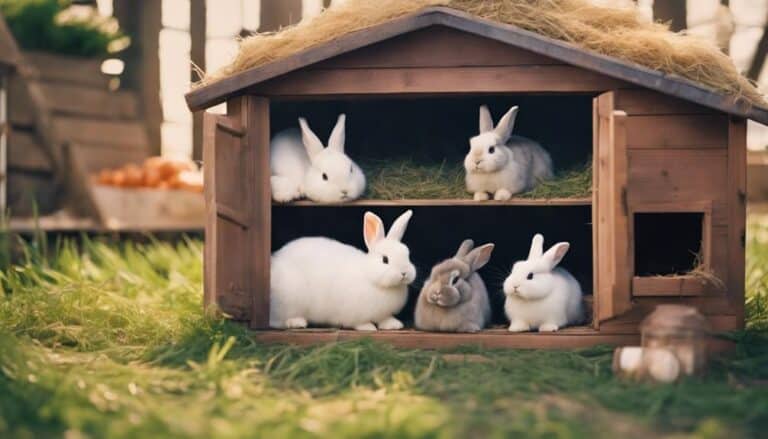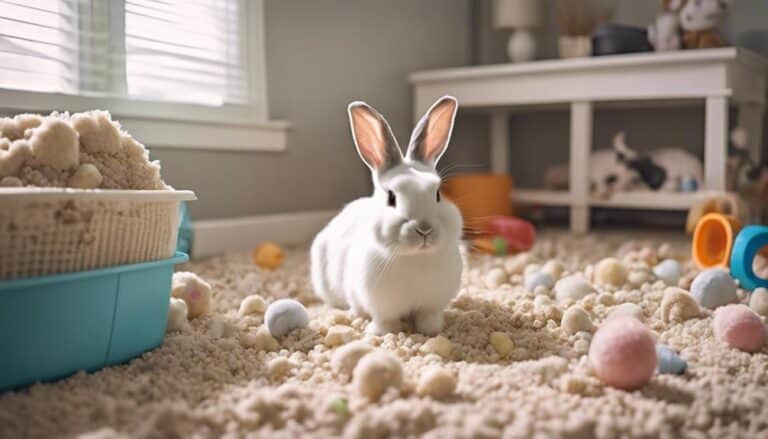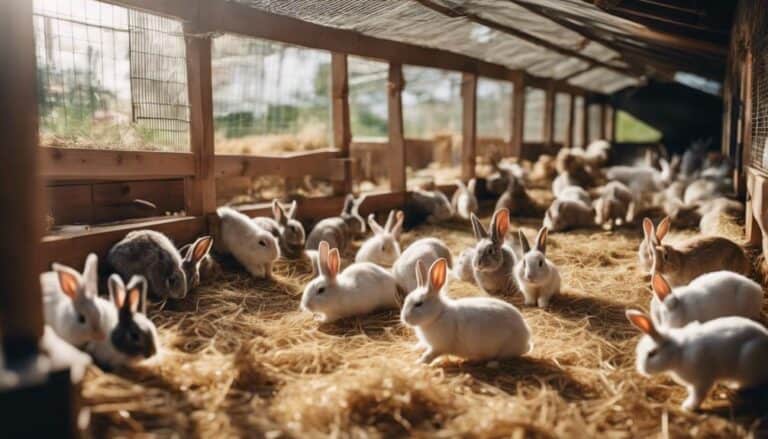To guarantee successful bunny breeding, you must prioritize the health and well-being of your rabbits above all else. But, did you know that there are specific health tips that can greatly impact the breeding process?
By focusing on preventative measures, nutrition, and environmental factors, you can set the stage for a successful breeding journey. However, there's more to uncover when it comes to enhancing your bunny breeding practices.
Let's explore the essential health tips that can make all the difference in your breeding endeavors.
Contents
- 1 Key Takeaways
- 2 Pre-Breeding Health Assessment
- 3 Nutritional Requirements for Breeding Bunnies
- 4 Environmental Considerations for Bunny Breeding
- 5 Preventative Healthcare Measures for Breeding Bunnies
- 6 Monitoring Bunny Reproductive Health
- 7 Addressing Common Breeding Health Issues
- 8 Veterinary Care During Bunny Breeding
- 9 Frequently Asked Questions
- 10 Conclusion
Key Takeaways
- Conduct thorough health assessments before breeding to ensure optimal health.
- Provide a balanced diet and proper nutrition for breeding rabbits.
- Maintain a suitable environment and implement preventative healthcare measures.
- Monitor reproductive health closely, address issues promptly, and seek veterinary care for breeding success.
Pre-Breeding Health Assessment
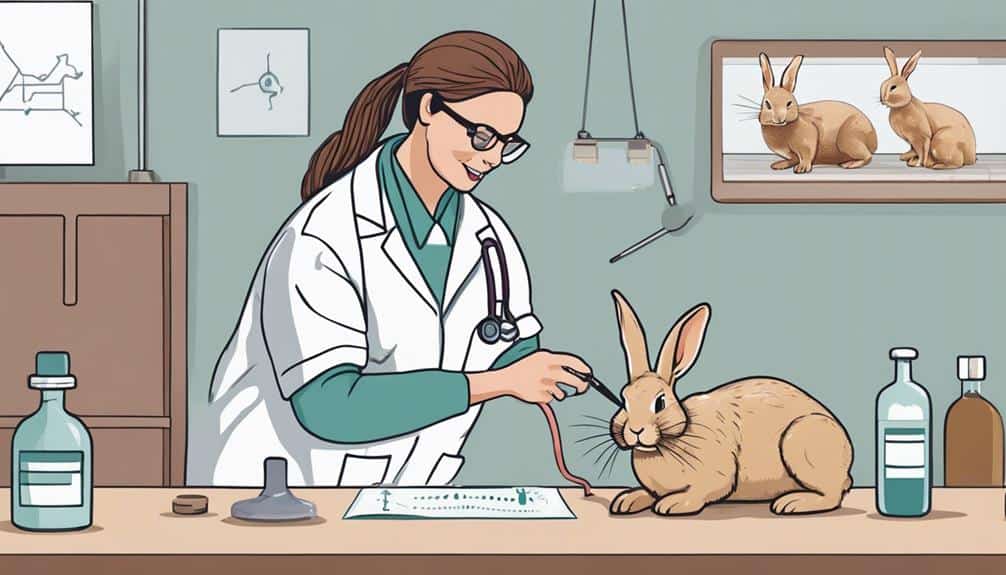
Before starting on the breeding journey with your rabbits, it's important to conduct a thorough health assessment to make sure they're in prime condition.
Check your rabbits for any signs of illness, injuries, or parasites that could potentially affect the breeding process. Inspect their body condition, weight, and overall health as these factors play a critical role in successful breeding outcomes.
Monitoring their health closely can help prevent any complications during the breeding period. If you notice any health issues, it's essential to address them promptly to improve their reproductive performance.
Consulting with a veterinarian before breeding is highly recommended to get guidance on pre-breeding health assessments and any necessary treatments. By ensuring your rabbits are in the best possible health before breeding, you're setting the stage for a successful and fulfilling breeding experience.
Your attention to their well-being won't only benefit them but also enhance the overall breeding process.
Nutritional Requirements for Breeding Bunnies
For your breeding bunnies, ensuring they receive key nutrients through a balanced diet is important for their overall health and reproductive success.
Fiber-rich hay and grass support their digestive system, while fresh vegetables provide essential vitamins and minerals.
High-quality pellets specifically formulated for breeding rabbits can offer the necessary protein, fiber, and nutrients they need for the best well-being.
Key Nutrients Essential
To guarantee prime health and reproduction success for breeding bunnies, prioritizing key nutrients in their diet is essential. Breeding rabbits, both does and bucks, have increased nutritional needs during mating and pregnancy. High-quality protein supports reproduction and lactation, while fiber, vitamins, and minerals are critical for overall health.
Make sure their diet includes fresh hay, leafy greens, and quality pellets to provide essential nutrients. Adequate water intake is crucial for hydration and milk production. Monitor their body condition regularly and adjust their diet as necessary to maintain prime health.
Balanced Diet Crucial
Ensuring a balanced diet rich in fiber, vitamins, and minerals is important for meeting the nutritional requirements of breeding bunnies and supporting their reproductive health. Breeding rabbits need high-quality hay as a staple, supplemented with fresh vegetables and limited pellets to maintain the best possible health.
Adequate protein intake is essential for growth, milk production, and overall reproductive success in bunnies. Calcium supplementation may be necessary for does to prevent uterine disorders and weak bones, ensuring a smooth breeding process.
Consulting with a veterinarian or experienced breeder is advisable to create a customized diet plan tailored to the specific needs of your breeding rabbits. Prioritizing a balanced diet won't only benefit the rabbits but also contribute to successful breeding outcomes.
Environmental Considerations for Bunny Breeding

When maintaining an ideal breeding environment for bunnies, it's important to keep the temperature between 50-70°F consistently. Proper environmental considerations are vital for the health and success of your breeding program.
- Ventilation: Ensure proper airflow in the rabbitry to prevent respiratory issues that could affect breeding productivity and overall health.
- Lighting: Provide adequate lighting to mimic natural daylight cycles, as light influences breeding behavior and reproductive success in rabbits.
- Cleanliness and Drafts: Keep the cage, nest box, and surrounding areas clean and free from drafts. This helps reduce stress on the rabbits, prevents illnesses, and promotes a conducive breeding environment.
Preventative Healthcare Measures for Breeding Bunnies
Regularly monitoring the health and well-being of your breeding bunnies is important for ensuring their reproductive success and overall vitality. To maintain their health, provide your breeding rabbits with a balanced diet rich in fiber, vitamins, and minerals. By offering quality nutrition, you support their reproductive health and increase the likelihood of successful breeding outcomes.
Additionally, keeping the rabbits in a clean environment is important to prevent the spread of diseases and infections. Implementing biosecurity measures further minimizes the risk of introducing illnesses to your breeding rabbits. Remember to watch for any signs of illness or discomfort in your rabbits and address them promptly.
Consulting with a veterinarian experienced in rabbit care for routine health check-ups and vaccinations is essential to guarantee the well-being of your breeding bunnies. Prioritizing preventative healthcare measures will contribute to the overall success and health of your breeding program.
Monitoring Bunny Reproductive Health
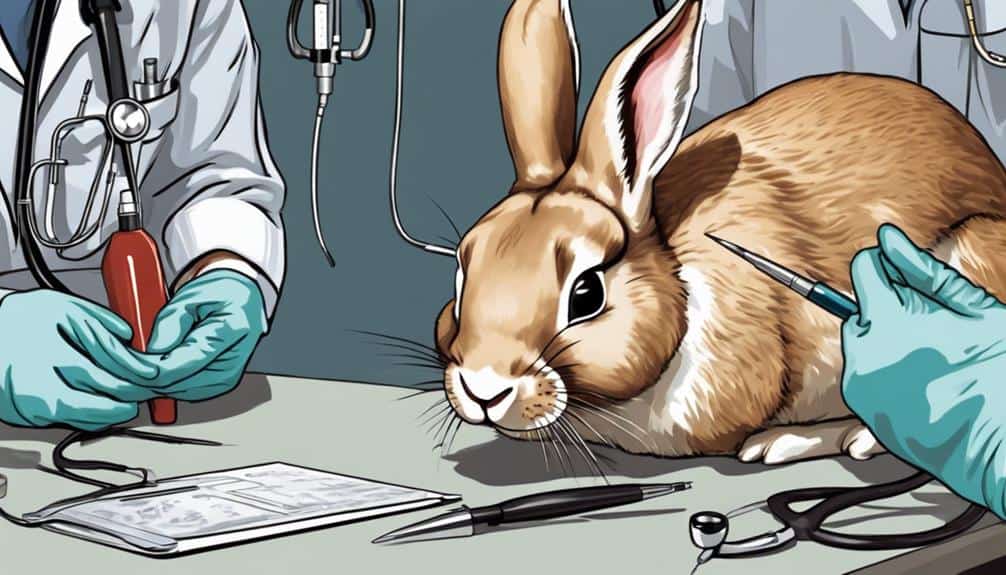
To maintain ideal reproductive health in your breeding bunnies, it's important to diligently monitor for signs of heat in does and any temporary sterility in bucks. Here are three key practices to help you guarantee the well-being of your bunny's reproductive system:
- Regularly Check for Signs of Heat in Does: By observing behaviors like increased restlessness, mounting other bunnies, or nesting activities in does, you can recognize when they're in heat and ready for breeding.
- Monitor Bucks for Signs of Temporary Sterility: Keep an eye on your bucks especially during hot weather, as high temperatures can lead to temporary sterility. If you notice any changes in behavior or mating success, it could be a sign of this issue.
- Keep Detailed Records of Mating Dates and Behaviors: Maintaining accurate records of when mating occurs, how frequently, and any unusual behaviors displayed during the process can help you track the reproductive health of your bunnies effectively.
Addressing Common Breeding Health Issues
Are you prepared to address common breeding health issues that may affect your rabbits' well-being? When breeding rabbits, it's important to monitor them for signs of respiratory infections such as sneezing, nasal discharge, and labored breathing. Providing a clean and well-ventilated environment is vital to prevent the spread of infectious diseases among your rabbits. Regularly checking for gastrointestinal issues like diarrhea, bloating, or reduced appetite is also significant in maintaining their health during breeding activities.
To safeguard your rabbits' well-being, implement a strict biosecurity protocol to reduce the risk of introducing pathogens into your rabbitry. If you notice any unusual symptoms or health issues, don't hesitate to consult with a veterinarian. Prompt veterinary consultation guarantees that any health problems are addressed promptly and with appropriate treatment, helping to maintain the overall health of your breeding rabbits and prevent the spread of infectious diseases.
Veterinary Care During Bunny Breeding
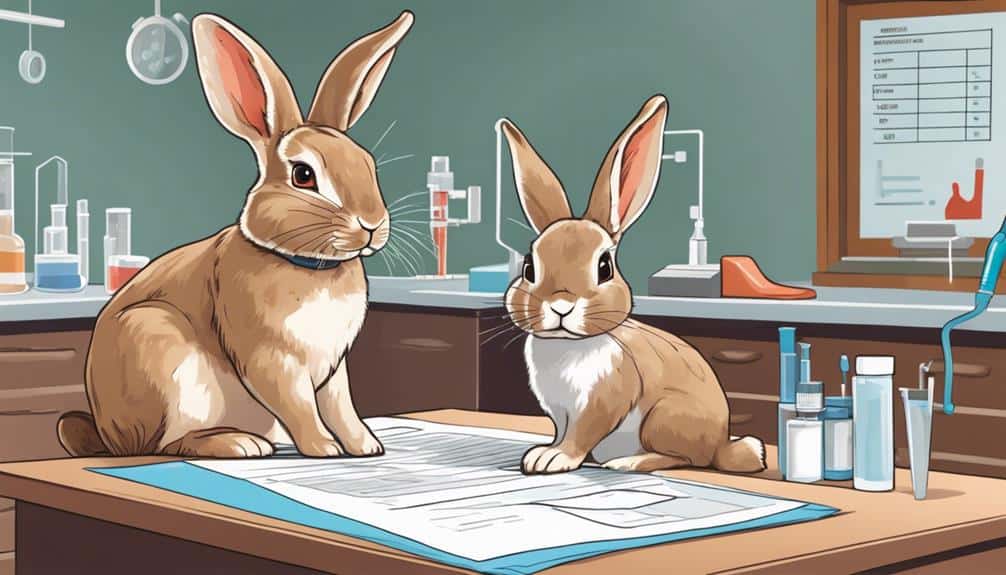
Ensuring the health and well-being of your breeding rabbits and their offspring requires regular veterinary check-ups during the breeding process. Here are essential aspects to ponder for veterinary care during bunny breeding:
- Vaccinations and Parasite Control: Include vaccinations and parasite control in your veterinary care plan to prevent diseases that can affect breeding success. Your rabbit-savvy veterinarian can recommend the most appropriate preventive measures.
- Monitoring Signs of Illness: Promptly monitor and address any signs of illness or discomfort in your breeding rabbits. Early intervention can prevent complications and ensure a smoother breeding process.
- Nutrition and Supplements: Seek veterinary guidance on nutrition, supplements, and overall care to optimize breeding outcomes and maintain the health of your breeding rabbits. A well-balanced diet and proper supplementation can positively impact the breeding process.
Establishing a relationship with a knowledgeable and essential rabbit-savvy veterinarian is crucial for effective veterinary care throughout the bunny breeding journey. Your veterinarian can provide valuable support and guidance, enhancing the health and success of your breeding efforts.
Frequently Asked Questions
How Do You Breed a Successful Rabbit?
To breed a successful rabbit, you need to focus on nutrition, housing, breeding age, health checks, behavior observation, genetic diversity, mating techniques, and pregnancy care. Providing these essentials guarantees healthy and thriving bunnies.
What Should You Do Before Breeding Rabbits?
Before breeding rabbits, you should prioritize their health by scheduling a veterinary check-up, observing behavior, ensuring proper nutrition, maintaining suitable housing conditions, considering genetic diversity, and keeping detailed records. Taking these steps sets the stage for successful breeding.
What Are the Qualities of a Good Rabbit Breeding?
When considering what makes a good rabbit breeding program, qualities such as fertility, maternal instincts, and growth potential are key. Select breeding pairs carefully, aiming for high fecundity and viability. Monitor and manage reproductive health closely.
How Do I Know if My Rabbit Mating Is Successful?
Wondering if your rabbit mating was successful? Look for signs like mating duration of 5-20 minutes, a submissive posture from the doe, and a mating plug in her genital area. These clues confirm breeding success.
Conclusion
As you wrap up your bunny breeding journey, remember that just like nurturing a delicate flower garden, tending to your breeding bunnies requires patience, care, and attention to detail.
By following the health tips outlined in this article, you can cultivate a thriving and successful bunny breeding operation that blossoms with healthy and happy bunnies.
Keep tending to your bunny garden with love and dedication, and watch it flourish into a beautiful and fulfilling experience.

